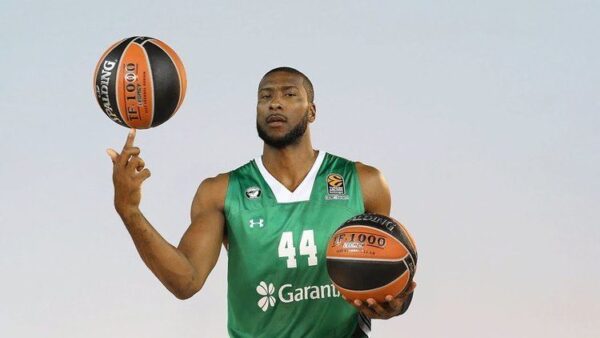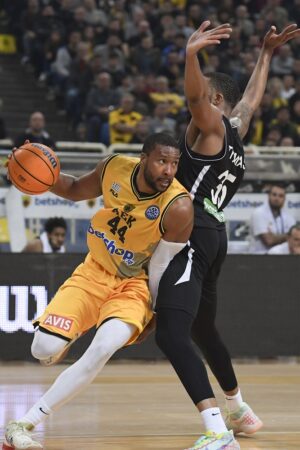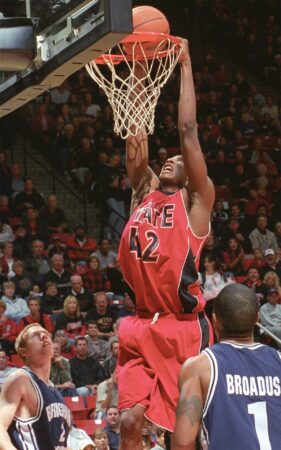Marcus Slaughter: With Great Talent, Comes Great Responsibility

Credit: Alchetron

The Journey
Former San Diego State Aztecs head coach Steve Fisher frequently used a “Phrase of the Day” as an ice breaker for team meetings or practices. Years later, these words of wisdom continue to speak to his former players. Marcus Slaughter told the East Village Times one phrase he remembers more than any other is, “With great talent comes great responsibility.”
Slaughter’s talent extends far beyond the basketball court to his friends, family, and teammates. With these gifts comes responsibility, and in every aspect of his life, Slaughter has always sought to set an excellent example of care, respect, and hard work.
In three seasons at SDSU from 2003-2006, Slaughter was a leader on the team that established the school as a winning program. With all due respect to the 2002 Aztecs that won the Mountain West Conference Tournament, a group that included Tony Bland, Al Faux, and Randy Holcomb, Slaughter’s 2006 team established SDSU’s reputation. 2002 could have been a one-off occurrence if not for the players who came afterward and built on their success.
Slaughters’ final year on the Mesa, the Aztecs captured the Mountain West regular-season and tournament crowns en route to an automatic tourney bid. Their success set the stage for SDSU to grow into a nationally recognized program and made the program a plausible choice for players like Malcolm Thomas, Billy White, and Kawhi Leonard.
Slaughter, in particular, helped establish San Diego as a destination for elite high school players. He was a four-star recruit, the 81st ranked player in the nation out of John W North High School in Riverside, CA. The success in his development proved the Aztecs’ coaching staff could work with the nation’s best talent. No longer did they have to exclusively sell their exploits with the Fab Five at Michigan. They could now point to Slaughter, whose growth from his freshman to junior year was plain for all to see.
After leaving the Aztecs, Slaughter made stops in Israel, Turkey, Spain, France, Germany, and Greece, to name just a few of the 50-plus countries he has frequented. Slaughter has played for 13 different teams in 15 years, including his latest stop in Greece with AEK Athens.
[wpedon id=”49075″ align=”right”]
Despite never establishing himself in the NBA (he signed a two-year non-guaranteed deal with the Miami Heat in 2007 but was waived a month later), Slaughter has become a pillar in the European basketball ranks.
He has won titles and yearly awards in the top European leagues. He has taken home championships in Spain, Germany, and Greece. In 2015, Slaughter won a EuroLeague title, which is one of the lasting memories of his career.
Among other awards, he was named the MVP of the Basketball Super League All-Star Game in 2007. He was the Spanish League Most Spectacular Player in 2011. This past year, he was a Greek League All-Star.

Though Slaughter has had less struggle than most overseas, he has overcome his share of adversity. Even more than in the NBA, teams outside the US treat their players as objects. This is especially true for Americans, who are brought over to be the best players on their respective teams.
From practice schedules to replacing players overnight, management’s priorities take place over the health and well-being of the player. An example from Slaughter’s last season provides a good example.
At the age of 35, Slaughter played with a torn meniscus for two months towards the end of the year until he could no longer run or jump. “I’m literally playing on one leg” is how he described it.
Unable to get any more out of him on the court, the team notified Slaughter on Sunday he would have surgery on Thursday that same week. Preparing to go under the knife and the subsequent four to six-week rehab, Slaughter got a call from his coach.
“Coach tells me, ‘I need you to play. You’re getting surgery anyway on Thursday, so nothing’s going to happen that’s worse. You’re getting surgery anyway, so it’ll fix anything that happens. I need you on Tuesday,’” Slaughter explained. “So, I go out there and play the game on Tuesday. We win the game. After the game, coach comes and says, “Hey, you think I can get another game out of you?”’
The pressure to play hurt is challenging and not uncommon either. The key to overcoming this objectification, according to Slaughter, is to focus on your game, keep going, and hone your craft to benefit those you are responsible for.
“You have to concentrate on doing your best to help the team win. Put your head down and do what you gotta do. Either way, you have to perform. Find your niche.”
Slaughter has learned a lot from playing overseas. He wouldn’t trade it for anything and has not once thought about hanging it up and calling it a career.
“I enjoy the game too much,” he said. “I still have the competitive nature. I get an itch. I hate being on the bench. I wanna play 40 minutes. I hate when a guy scores on me. I want to win, get out there and compete.”
These negative episodes aside, Slaughter has had an incredible experience overall playing the game he loves. It has allowed him to provide for his family and travel the world.
“Basketball has been able to show me 50 plus countries. I can say, ‘Hi’ in 10 different languages. I’ve had three passports, all full. It’s been a beautiful thing.”
Remembering Aztec Nation
The memories from his Aztec days are endless. Among them, March 1, 2006, is one of Slaughter’s favorites. It was a victory at then-Cox Arena against Wyoming to seal the program’s first regular-season conference championship since 1978. Slaughter scored 20 points and added nine rebounds in the 91-72 victory over the Cowboys.
SDSU defeated Wyoming 10 days later, 69-64, in the Mountain West Conference Tournament championship. Slaughter was named the MVP of the tournament. Across three games, he put up 49 points and 46 rebounds. Two days later, Slaughter fulfilled a childhood dream of hearing his team’s name called on Selection Sunday.
“In one of the auditoriums, we were waiting for our seed to be called for the tournament,” Slaughter said. “Growing up as a kid, you always see that moment. That was big to be able to experience that moment. There aren’t a lot of people that can say they’ve been able to go to the tournament.”
The Aztecs earned an 11-seed and a first-round matchup against Indiana. SDSU fought hard but came up short, 87-83. Slaughter scored 13 points with ten boards in the loss.

A month later, following his junior season, Slaughter left the SDSU to pursue a professional career leaving behind a tremendous legacy. Before the 2006 team won their titles, the Aztecs had made just four trips to the NCAA Tournament. Since then, San Diego State has heard their name called on Selection Sunday eight times and earned their way to two trips to the Sweet Sixteen.
Years after leaving the Aztecs, Slaughter has remained in San Diego and still keeps an eye on the Aztecs from afar, cheering them on day in and day out.
“Thank you for all the support always and being there from the jump, from the beginning until now,” Slaughter replied when asked what message he would want to give to the Aztec faithful. “Also, (we want to) let them know, we haven’t left. We still live in San Diego.”
“We will still be there (in the future), creating something there as well. Like I said (working) with the kids, giving back. Just continue to support the Aztecs. That’s a great foundation that’s been built, and we want to keep it going. It’s the number one team in California, the number one university in California, the best fans, who are consistent. We want to continue that always.”
The Path Ahead
From Riverside to San Diego State to exotic destinations worldwide, he has found success wherever he has gone. However, it is the people he met along the way that has become the biggest prize in his life.
Slaughter remains best friends with John Sharper and Mohamed Abukar, who were both a part of that 2006 Aztecs team that cemented the program’s legacy.
The three all reside in San Diego and are establishing a youth basketball program in San Diego called Worldwide Elite Academy. The purpose is to share what they have learned from their basketball careers while giving back to their city.
“We want to give back and to the community of San Diego. It’s like our second home. We want to build something to grow there. Stay close to each other.”
As teenagers arriving at San Diego State, the relationships formed have lasted for nearly 20 years. Sharper was on hand to watch Slaughter capture his EuroLeague title in 2015 and now is focusing on their next chapter whenever their basketball careers end.
Marcus Slaughter is now a father and loves every moment of it. His daughter, Siena, turned three earlier in June. His family has supported him every step of the way through his basketball journey.

Although Slaughter’s contract with AEK Athens is up, he still plans to play basketball for a couple of years.
“I hope I got another two more years, God-willing,” Slaughter said when asked how much longer he intends to play professional basketball. “You never know. Whenever your time and your body. It’s hard. But it’s still satisfying at the end of the day. I want to do it as long as I can because when it’s over, it’s over.”
Slaughter is embracing every second he can play the game he loves. Basketball has provided him the chance to travel the world and allowed him to provide for his family while imparting valuable lifelong lessons along the way. All told, he has embraced the great responsibility that comes with his great talent.
Matthew Wadleigh, born in Oceanside and currently lives in Fresno. He lives with his wife and 2 dogs and is a sports enthusiast. Retired drummer and member of the Fresno State Marching Band. He has been a Padres fan since childhood and has suffered during the struggles just like everybody else.